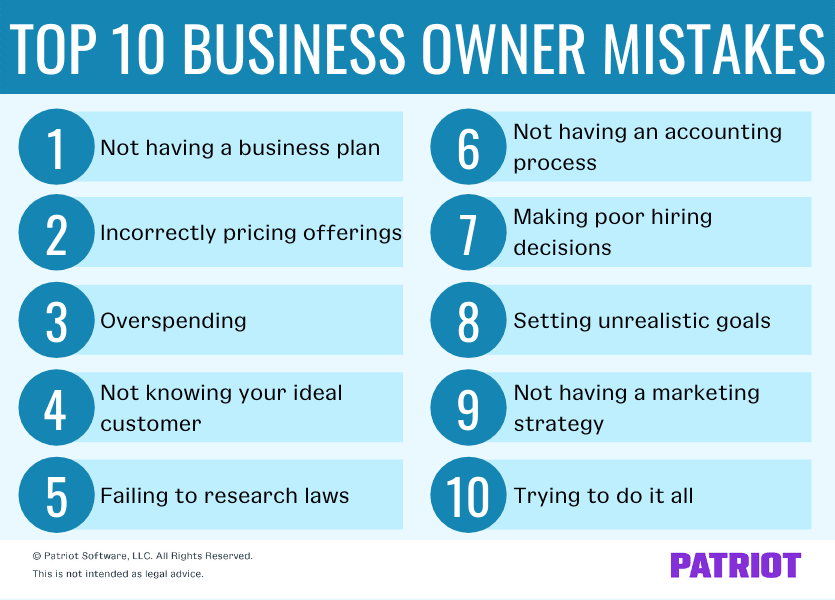Part of being a business owner (and being human) is making mistakes along the way. Blunders happen to the best of the best, and learning from them can help you grow as an entrepreneur. And chances are, you’re not the only one making business mistakes. In fact, there are a whole bunch of common mistakes business owners make when starting out. You just need to know what they are so you can avoid them.
Business mistakes small business owners make
Business mistakes happen to each and every owner out there. Making mistakes is inevitable in business. But, you can cut down on the mistakes you make as a business owner by knowing which ones to avoid in the first place. So, what’re some of the mistakes you can make while starting out? We’ll give you 10.

1. Not having a solid business plan
Your business plan can help lay a solid foundation for your startup. But if your plan is incomplete or all over the place, it won’t be a helpful roadmap to success. And if you fail to plan, you are essentially planning to fail.
Failing to have a solid and thorough business plan can hurt your business in a number of ways. After all, your plan is supposed to go over everything from funding to marketing. To ensure your business plan is as clear as can be, include the following information in it:
- Executive summary
- Company description
- Market analysis
- Organization and management
- Service(s) or product(s)
- Sales and marketing
- Funding
- Financial projections
The more information you include in your plan, the better. However, don’t add words just to add fluff. Your plan should be detailed, but it should also be easy to read and digest. Be thorough in each section, and break up text with images (e.g., graphs) and bullet points.
Creating a solid, in-depth plan can help your business start off on the right foot and lead you down a path to success.
On the importance of doing thorough research and coming up with a solid plan, Vincent D’Eletto, founder and CEO of WordAgents, said:
Don’t underestimate the need for proper planning. As excited as you might be to get started with your new business, don’t make the mistake of rushing in too quickly. If you take a leap of faith without planning in advance, you run the risk of being blindsided by unexpected setbacks and hidden costs. Instead, make sure you know where you stand, and conduct thorough research to understand your competitors, target audience, and operating costs. Don’t leave yourself in the dark. Otherwise, you might be in for an unpleasant surprise when your business doesn’t work out.
2. Incorrectly pricing offerings
According to one study, 77% of business owners attribute their failure to not properly setting their prices. Setting prices is oh-so-important for your business’s success. If you overprice offerings, you could drive potential customers away with high prices. And if you underprice offerings, you could miss out on a lot of extra cash flow.
Not sure where to start when it comes to pricing your offerings? Here are a few ways you can ensure you set prices that work for both your business and your customers:
- Calculate costs
- Look at the market
- Know your customers
- Get to know margin and markup
- Consider time spent
Don’t set prices all willy-nilly. Instead, do some research to determine what a fair price is for your offerings. Just like Goldilocks and her porridge, you want your prices to be just right.
3. Overspending
Starting a business means lots of expenses and unexpected costs. But, the last thing you want to do is overspend. And unfortunately, not sticking to a business budget and spending too much is a mistake too many business owners make when starting out.
To steer clear of overspending and put more cash in your pockets, you can:
- Stick to a set budget
- Cut out unnecessary expenses (e.g., subscriptions)
- Crunch numbers before you buy
- Negotiate deals
- Monitor cash flow
- Research cheaper alternatives
- Track spending
- Set financial goals
Monitor your expenses and cut down on costs to help keep your spending in check. That way, you avoid overspending and the stress and problems that come with it.
4. Not knowing your ideal customer
A big blunder you can make as a first-time entrepreneur is not knowing who your ideal customer is. And if you don’t know your ideal customer, you could wind up targeting and marketing to the completely wrong group.
So, what’s a business owner to do? To ensure you’re targeting the right customers, you have to be willing to do some research. You can (and should):
- Look into demographics and psychographics
- Check out your competitors’ ideal customers
- Identify existing customer groups or segments
- Analyze any and all information you have
- Create customer personas
- Conduct surveys
- Use insights (e.g., Google Analytics)
Do you want to be a business owner who wastes time, money, and energy targeting the wrong customers? Of course not! Instead of winging the whole “target market” thing, do some homework to pinpoint who would really be interested in your offerings and what makes them tick.
5. Failing to research laws
Business owners have a lot of things to stress over: Funding, accounting, hiring, keeping up with laws … the list goes on and on. But some things are worth stressing over, like staying compliant with laws. Why? Because failing to research and comply with laws can cost you a lot more than you think in the long run.
Roughly 25% of small businesses operate with workers’ compensation insurance, yet it’s a requirement in many states. Not getting workers’ comp when your state requires it can result in penalties and fees. This is just one example of how lack of knowledge on tax laws can be a major mistake and get you in a bind later on.
To avoid this business blunder, brush up on the following laws:
- Payroll tax laws
- Employment laws
- Business tax laws
- Workplace laws
6. Not having an accounting process
If you want your finances to stay on track and to have accurate reports, you need to keep your books up-to-date. Skipping out on choosing an accounting process and utilizing it can cause a lot of problems for your business and its finances. So instead of making the mistakes and brushing off accounting, find an accounting process as soon as possible.
When it comes to accounting, you generally have a few options:
- Doing manual updates (e.g., spreadsheets): Cheapest option with room for errors
- Hiring a tax professional: Most expensive option with peace of mind that your books are accurate
- Using accounting software: Happy medium with fewer chances of accounting errors (and you can pass along reports to your accountant)
Whatever you decide to do, don’t make the mistake of putting your accounting books on the backburner. Putting off accounting can result in inaccurate totals and reports, missed transactions, and a financial mess for your business (which nobody wants to deal with).
7. Making poor hiring decisions
At one point or another, you will probably hire an employee (or a few) to help you out around your business. But, a major mistake many business owners make is making poor hiring decisions or hiring too soon.
Before you go off and hire your first employee, make sure you’re ready for the expenses and responsibilities that come along with it. As an employer, you are responsible for following workplace and payroll laws and withholding taxes from employee wages. If you’re unsure whether or not it’s time to hire, make a list of pros and cons.
Making a bad hiring decision can lead to a waste of your time and money. Once you decide it’s time to hire, steer clear of making poor hiring decisions by:
- Taking your time when hiring
- Making sure the candidate is qualified
- Asking others for their opinion
The more research you do on a candidate, like reviewing their resume and getting to know them via interviews, the better your hiring decisions will be. Instead of rushing the process, take your time to find the ideal candidate that fits in well at your business.
8. Setting unrealistic goals
Goals, goals, goals. As a business owner, you’ve been setting goals since day one of following your entrepreneurial dream. And, the need to set goals doesn’t just go away after you kickstart your business. But if you actually want to reach said goals, they need to be realistic and smart.
Another one of the biggest business mistakes to avoid is setting unreachable goals for yourself and your company. To help avoid making this mistake, set SMART goals for your business along the way:
- Specific
- Measurable
- Attainable
- Relevant
- Time-bound
Use SMART goals to set all of your goals from planning your budget to increasing your customer count. That way, you don’t miss out on any details along the way and can set goals that you can realistically achieve in an appropriate time frame.
9. Not having a clear marketing strategy
Marketing is a must for small business owners, especially when you’re trying to get your startup off the ground. But if you waste time using the wrong marketing tactics, you will make a big mistake.
Set out to have a clear marketing strategy when starting your business. This means having all of your marketing ducks in a row by:
- Completing a market analysis
- Researching your market
- Determining what you will use for marketing (e.g., social media)
- Setting a marketing budget
- Establishing goals
- Listing out techniques
- Testing out marketing tactics to see what works
- Creating a marketing plan
10. Trying to do it all
It’s no secret that business owners are basically professional jugglers. You’re responsible for balancing a number of tasks each day. But one mistake business owners make? Trying to juggle all of their responsibilities on their own.
As The Beatles said, “I get by with a little help from my friends.” And, you should, too. If you want your business to thrive, you need to get help from others and not be afraid to delegate tasks.
Instead of making the mistake of trying to do it all yourself, embrace help and ask for it when needed. Hire an employee or ask your friends or family for assistance to get some responsibilities off your plate. Don’t burn yourself out attempting to do everything on your own.
This is not intended as legal advice; for more information, please click here.



